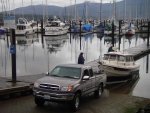cattlejack
Member
I have a 2008 Chevy Colorado Z71 4X4 3.7 in line 5 cylinder
Will I enable to tow a 2008 Cory 22 with trailer?
Just what to be safe and sure
Will I enable to tow a 2008 Cory 22 with trailer?
Just what to be safe and sure

